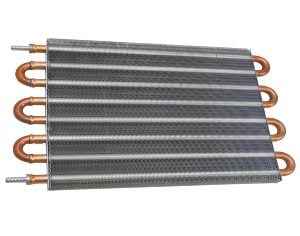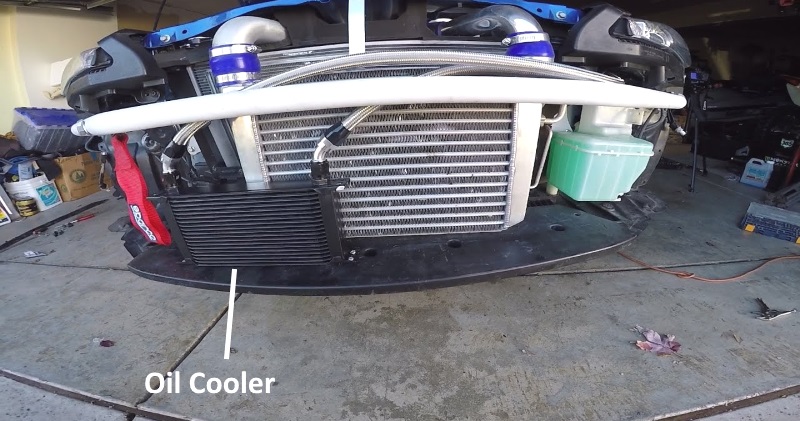What is the oil cooler?

The oil cooler is a smaller radiator found next to the engine cooling system radiator. Oil coolers are commonly found in performance engines, however, they often appear in automatic vehicles as well.
Sometimes the oil cooler is built into the main engine radiator.
The oil cooler’s purpose is to remove excess heat from your engine’s or transmission’s oil. It does this by sending the oil through a series of tubes. Surrounding these tubes are cooling fins which increase the surface area between the tubes and the surrounding air, helping the cooling process. This process allows for the engine or transmission oil to stay much cooler, with reduced risk of the oil and therefore engine or transmission overheating.
Learn more about how the oil cooler works >
Causes of oil cooler problems:
Most of the time, the oil cooler should run correctly without needing servicing. In fact, many drivers don’t even know they have one! However, if things go wrong with the oil cooler, they can cause serious, expensive damage to your car. Causes of oil cooler problems include:
Oil leaks – Oil can leak from the cooler if it becomes cracked. This can sometimes happen from frontal impacts or small impacts. This can result in your engine being starved of oil.
Failed/broken tubes – The oil cooler is connected to the engine and radiator via a series of tubes and hoses. Any damage to these tubes or oil hoses can prevent the oil from being cooled properly.
Low coolant – If the engine coolant is leaking from your vehicle, the oil cooler may struggle to be able to remove heat from the oil properly. This can result in overheating.
Learn more about coolant leaks >
Symptoms of a damaged oil cooler:
The following symptoms point to oil cooler damage:
Overheating – Perhaps the most obvious symptom, overheating happens when your engine or transmission reaches high temperatures. This happens due to the oil not cooling properly and being sent back into the automatic transmission / engine. We recommend that you avoid driving if your automatic transmission / engine is overheating. This is because it can damage automatic transmission and engine components, resulting in a very expensive repair.
What to do if your car overheats >
Oil leaking – An oil leak can point to several different problems in your engine, including damage to the oil cooler. Oil leaks often present themselves as small puddles of oil under your engine bay. You should get oil leaks inspected and replaced as soon as possible before they cause damage to your engine.
Oil and coolant mixing – A mix of oil and coolant could point to a problem in the oil cooler. Any leaks or cracks inside the oil cooler can cause the oil and coolant to mix together and disperse around your engine, resulting in overheating and increased engine wear. Mixing oil and coolant will result in your vehicle needing an oil and coolant flush immediately.
How important is an oil cooler replacement?
A damaged oil cooler can cause serious damage to your automatic transmission or engine, especially if the problem isn’t quickly fixed. Getting your oil cooler repalced early will save you a lot of money. This is because mechanics won’t have to fix automatic transmission or engine components or flush your oil/coolant.
Oil Cooler Replacement Service in Hamilton
Is your oil cooler in need of replacement? If so, we can help!
At Grimmer Motors, we can provide reliable, effective diagnostics for your car’s oil cooler. Whether is a replacement or a coolant/oil flush, our team of skilled mechanics can quickly diagnose problems in your vehicle and provide you with a quality solution.
For oil cooler services and replacement in Hamilton, contact Grimmer Motors today!

